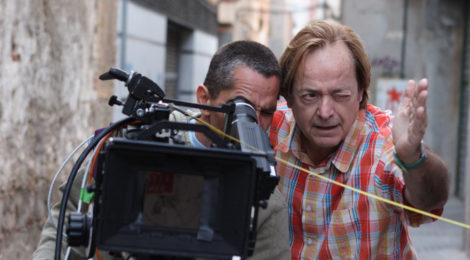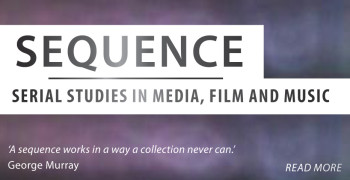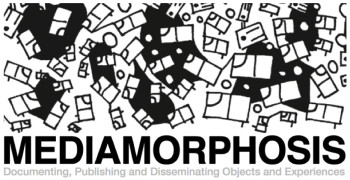
Ventura Pons 1945-2023
Header image: Ventura Pons (Courtesy of Els Films de La Rambla)
This week at Mediático we mark the passing of Catalan filmmaker Ventura Pons with a tribute written by Santiago Fouz Hernández, Professor in the School of Modern Languages at Durham University. Professor Fouz Hernández’s research focuses on masculinities and male bodies in contemporary film and popular culture. He is the author of Cuerpos de cine: masculinidades carnales en el cine y la cultura popular contemporáneos (Bellaterra, 2013) and co-author of Live Flesh: The Male Body in Contemporary Spanish Cinema (I B Tauris 2007). He is also the co-organiser of the Bigas Luna Tribute which has involved 100 screenings, several art exhibitions and other events since 2015. He also produces and co-hosts the Bigas Luna podcast, the most recent edition of which – Bigas Luna’s Segon Origen with director Carles Porta can be listened to here. Fouz Hernández’ Romance Quarterly essay on queer ageing in Ventura Pons films came out this week and can be read here.
Ventura Pons 1945-2023
Ventura Pons, who passed away in his home in Barcelona on January 8th at the age of 78, was one of Europe’s most prolific and stimulating filmmakers of recent times. Few have been able to sustain an internationally impactful career with the consistency, ideological commitment, and aesthetic edge that he demonstrated since the 1970s (and for a decade prior to this in the Catalan theatre scene) until his death.
His first film, the documentary Ocaña, retrat intermitent/Ocaña an Intermittent Portrait (1977) was included in the official selection in the ‘Un certain regard’ section at the Cannes Festival the following year and is now widely recognised by film critics and historians internationally as a key text of the Spanish Transition. It was one of the first films released in Spain prior to the abolition of Francoist censorship to feature both a queer protagonist and full-frontal male nudity. Pons remained defiant throughout his film career, releasing over thirty feature films, and exploring a wide range of genres, from documentary to comedy or drama.
Between 1966 and 1977 he worked as a theatre director. He was a leading member of the independent theatre movement in Barcelona that played an important role in challenging the authoritarian cultural control exercised by the Franco dictatorship, in developing innovative theatrical forms, and in reviving theatre in the Catalan language. In the 1980s Pons founded his own film production company, Els Films de la Rambla, which remains active today under the new management of Miquel Rey.
Pons’ work was exemplar of cultural activism, both in terms of queer liberation and Catalonian independence, motivated by an unwavering passion for his homeland and for human rights. Shortly after the trailblazing Ocaña, retrat intermitent (which still captivates young queer audiences today) he released the often forgotten but immensely valuable and historic Informe sobre el FAGC (1979), a short documentary that immortalised the first Pride march in Spain, held in Barcelona in June 1979, led by the Front d’Alliberament Gai de Catalunya. The FAGC was the first organisation of its nature to be legalised in Spain only four years earlier. Over the years he incorporated LGBTQ+ characters and homoerotic subplots to many of his feature films, considerably contributing to normalising queer lives on the screen. Some of these films have become LGBTQ+ film classics, including Amic/Amat Beloved/Friend (1999), his first English-language film Food of Love (2002), or Ignasi M (2013), a documentary that some see as a modern-day update of his Ocaña. Ignasi M focuses on the fascinating life of Pons’ museologist friend Ignasi Millet, who came out later in life as both gay and HIV+. His former wife (now living in a lesbian relationship) and their two adult children also appear in the film. His very last release was the English-language musical Be Happy! (2019), focused on the romantic relationship between two men, who express their love through song and quotes from classic literary texts and popular culture. Many of his films favour marginal perspectives and voices, including, against the grain, those of older men and women. Siân Phillips was 85 and Claire Bloom 87 when Pons cast them for Miss Dali (2018). A year later they both returned for Be Happy! Pons valued the experience and charisma of older actors, crucial to underscore his narrative interest in cultural memory.
His life-long commitment to promoting the language and culture of Catalonia is best demonstrated in his work with well-known Catalan actors (often already established in theatre but new to film), his fondness of Barcelona as a setting and his adaptation of Catalan novels and plays by acclaimed authors and dramatists including Quim Monzó (El perqué de tot plegat/What’s It All About? 1995; Mil cretins/A Thousand Fools 2011); Sergi Belbel (Carícies/Caresses 1998; Morir o No/To Die (or Not) 2000; Forasters/Strangers 2008), Josep Maria Benet i Jornet (Actrius/Actresses 1997; Amic,Amat/Beloved, Friend 1999), or Lluisa Cunillé (Barcelona, un mapa/ Barcelona, a map 2007). He was also a pioneer in releasing his films in the original Catalan with Spanish subtitles, refusing to make Spanish-language or dubbed versions.
Pons’ literary adaptations of Lluís-Anton Bualenas, Anita no perd el tren/Anita Takes a Chance (2001), starring his regular Rosa María Sardà, and Amor idiota/Idiot Love (2005) are among his greatest domestic box office hits, while the mentioned Food of Love, based on David Leavitt’s novel, and starring Juliet Stevenson and Allan Corduner, became one of his best-known films in international markets, together with Carícies and Actrius.
Many film festivals and societies around the world (from Colombia to France, Mexico to Sweden or the USA) have programmed dedicated retrospectives, with Pons often in attendance. During the 1990s and part of the 2000s his films were regularly selected for major international film festivals, including the Berlinale for five consecutive years. Due to the socio-historical and cultural interest of his films, Pons has also been the subject of many academic articles, books, and conferences, including a four-day dedicated symposium at the University of Colorado Denver in 2012, which was followed by a volume of essays published in 2015.
He was Vice-President of the Spanish Film Academy (1998-2001) and received many awards and prestigious recognitions, including the Spanish Ministry of Culture’s Gold Medal for the Arts (2001), the Catalan Government’s National Prize for Cinema (1995), the Cross of Sant Jordi (2007), and the Gaudí D’honor (2015) in recognition of his unparalleled career in Catalan cinema.
In addition to writing scripts, his memoir, and a travel book in the last decade of his life he also reopened three cinemas in Spain and founded an art cinema distribution company (Alba Films), demonstrating a passion for and a generous commitment to cinema that transcended his own work at a time of crisis in the sector. He will be remembered as an outgoing and extremely generous person who cared about the industry, and anyone connected with it. He was always happy to provide materials for academics researching his films but without ever interfering with the work (‘I make the films; it is your job to interpret them’ he used to say when attending academic papers about his work). Loyal to his friends and colleagues, he was enthusiastic about the touring retrospective that paid homage to his contemporary Bigas Luna, who opened Bilbao at Cannes in the same edition where Pons was presenting Ocaña right at the start of their filmmaking careers. He offered the cinemas he then managed in Barcelona (2016) and Valencia (2017) for the events and most recently presented La teta y la luna/The Tit and The Moon (Bigas Luna, 1994) in London as part of the 19th Spanish Film Festival (2023) in what would become his last public engagement.
by Santiago Fouz Hernández






